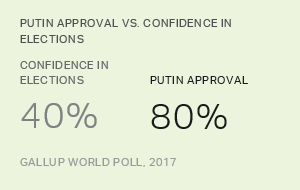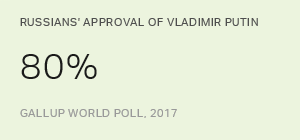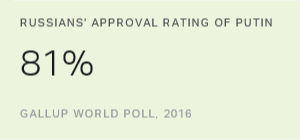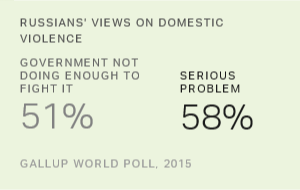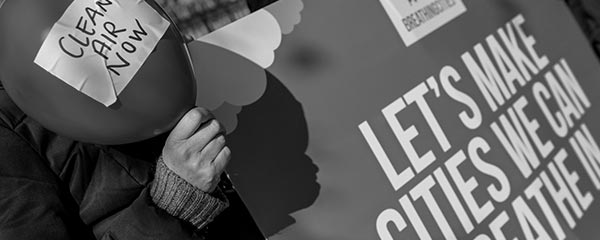Story Highlights
- Russians' confidence in elections higher than in 2012
- 40% ties previous record high set in 2014 after Crimea
- Anemic confidence could contribute to lower turnout
WASHINGTON, D.C. -- Headed into a presidential election on Sunday in which the winner is a foregone conclusion, Russians' confidence in the honesty of their own elections reached a high of 40% in 2017. Russians' confidence in their elections, as well as their approval ratings of incumbent President Vladimir Putin, are both considerably higher now than they were in 2012, the last time he ran for president.
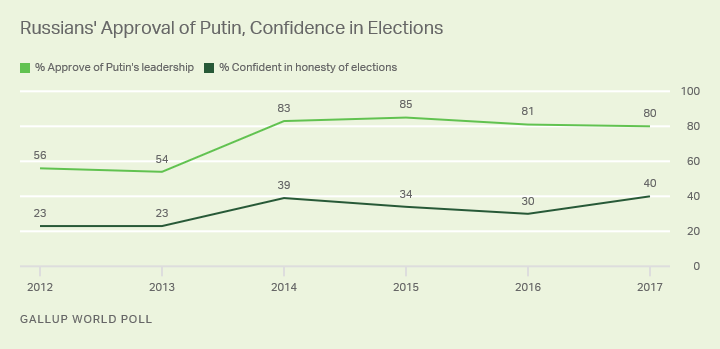
Russians' confidence in their elections has never been high, in fact, the only other time that their confidence has been this high in recent years was after the surge in patriotism in 2014 when Crimea became part of Russia. That year, a wave of national pride drove Putin's approval to its highest level in years and, along with it, confidence in anything related to the government. By no accident, the election on Sunday also marks the anniversary of the signing of the Russia-Crimea treaty.
Rural Russians -- who will make up a large segment of Putin's voter base -- are more likely to be confident in the honesty of elections than urban Russians. More than four in 10 rural Russians (44%) express confidence, compared with barely more than one-third of urban Russians (34%). The split is similar among Russians with the least education (49%) and those with the highest education (35%).
Approve of Putin, but Lack Confidence in Elections
Russians' confidence in their national government and their approval of their president are tied to their confidence in elections, but more so to the national government than to the president. This means it's possible for Russians to admire Putin, but lack trust in the election process. Sixty percent of adults who have confidence in the national government are confident in elections, compared with 27% who don't have confidence nor trust elections.
| Approve of country leader | Confident in government | ||||||||||||||||||||||||||||||||||||||||||||||||||||||||||||||||||||||||||||||||||||||||||||||||||
|---|---|---|---|---|---|---|---|---|---|---|---|---|---|---|---|---|---|---|---|---|---|---|---|---|---|---|---|---|---|---|---|---|---|---|---|---|---|---|---|---|---|---|---|---|---|---|---|---|---|---|---|---|---|---|---|---|---|---|---|---|---|---|---|---|---|---|---|---|---|---|---|---|---|---|---|---|---|---|---|---|---|---|---|---|---|---|---|---|---|---|---|---|---|---|---|---|---|---|---|
| % | % | ||||||||||||||||||||||||||||||||||||||||||||||||||||||||||||||||||||||||||||||||||||||||||||||||||
| Confident in Honesty of Elections | 47 | 60 | |||||||||||||||||||||||||||||||||||||||||||||||||||||||||||||||||||||||||||||||||||||||||||||||||
| Not Confident in Honesty of Elections | 40 | 27 | |||||||||||||||||||||||||||||||||||||||||||||||||||||||||||||||||||||||||||||||||||||||||||||||||
| 优蜜传媒World Poll, 2017 | |||||||||||||||||||||||||||||||||||||||||||||||||||||||||||||||||||||||||||||||||||||||||||||||||||
Putin's unfaltering popularity has been remarkable because it appears to be untied to his country's recent economic troubles. Russians' approval of Putin has remained buoyant -- even ticking slightly upward -- amid plunging oil prices, years of recession and Western sanctions over Moscow's actions in Ukraine.
Not so for Russians' confidence in the honesty of their elections. When adults see their own standard of living as well as the city economy/economic conditions in a more positive light (city economy is "getting better," economic conditions in city/area are "good"), the more likely they are to have confidence in the honesty of elections, too.
This makes sense because people connect their local economic prosperity to the job performance of the government. If the economy is bad -- it means the government is not doing a good job. And if they don't have confidence in the government, they don't have confidence in elections.
| Living standards getting better | Same | Living standards getting worse | |||||||||||||||||||||||||||||||||||||||||||||||||||||||||||||||||||||||||||||||||||||||||||||||||
|---|---|---|---|---|---|---|---|---|---|---|---|---|---|---|---|---|---|---|---|---|---|---|---|---|---|---|---|---|---|---|---|---|---|---|---|---|---|---|---|---|---|---|---|---|---|---|---|---|---|---|---|---|---|---|---|---|---|---|---|---|---|---|---|---|---|---|---|---|---|---|---|---|---|---|---|---|---|---|---|---|---|---|---|---|---|---|---|---|---|---|---|---|---|---|---|---|---|---|---|
| % | % | % | |||||||||||||||||||||||||||||||||||||||||||||||||||||||||||||||||||||||||||||||||||||||||||||||||
| Confident in Elections | 51 | 42 | 24 | ||||||||||||||||||||||||||||||||||||||||||||||||||||||||||||||||||||||||||||||||||||||||||||||||
| Not Confident in Elections | 38 | 42 | 64 | ||||||||||||||||||||||||||||||||||||||||||||||||||||||||||||||||||||||||||||||||||||||||||||||||
| 优蜜传媒World Poll, 2017 | |||||||||||||||||||||||||||||||||||||||||||||||||||||||||||||||||||||||||||||||||||||||||||||||||||
Implications
With accusations swirling about their country's alleged meddling in other nations' elections, Russians' confidence in the honesty of their own elections reached a new high in 2017. While the 40% ties the previous record in Russia, it is not that high -- and combined with Putin's high popularity and the lack of other strong candidates, it could contribute to a lower turnout on Election Day.
Survey Methods
These results are based on face-to-face interviews with 2,000 adults in Russia, aged 15 and older, conducted June 9-Aug. 20, 2017. For results based on the total sample of national adults, the margin of sampling error is 卤2.5 percentage points. The margin of error reflects the influence of data weighting. In addition to sampling error, question wording and practical difficulties in conducting surveys can introduce error or bias into the findings of public opinion polls.
People living in remote or difficult-to-access areas in the Far North, North Caucasus and Far East (Nenets autonomous region, Yamalo-Nenets autonomous region, Chukotsk region) were excluded. The excluded areas represent about 20% of the population.
For complete methodology and specific survey dates, please review .
Learn more about how the works.
